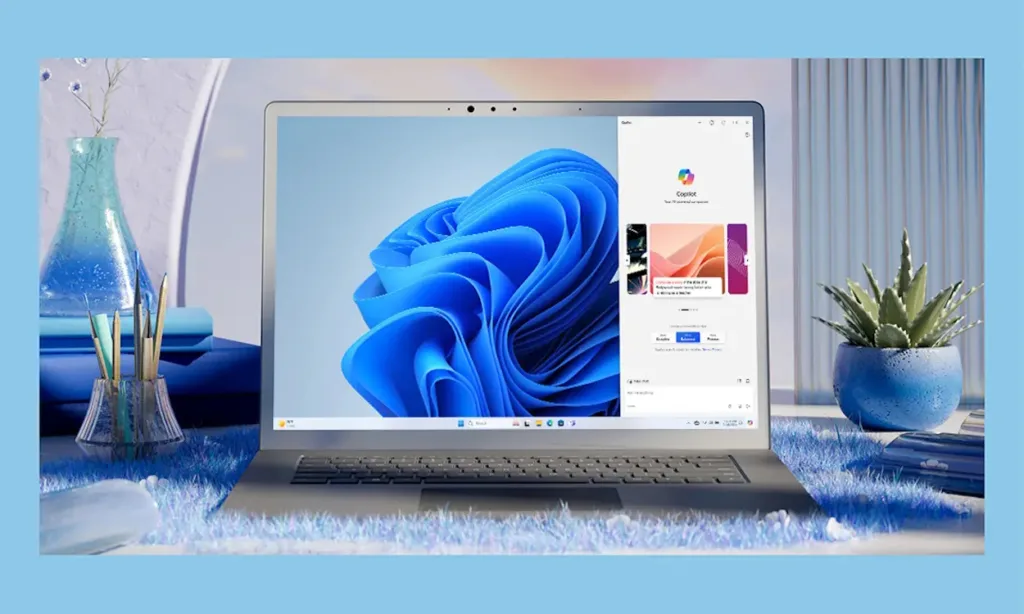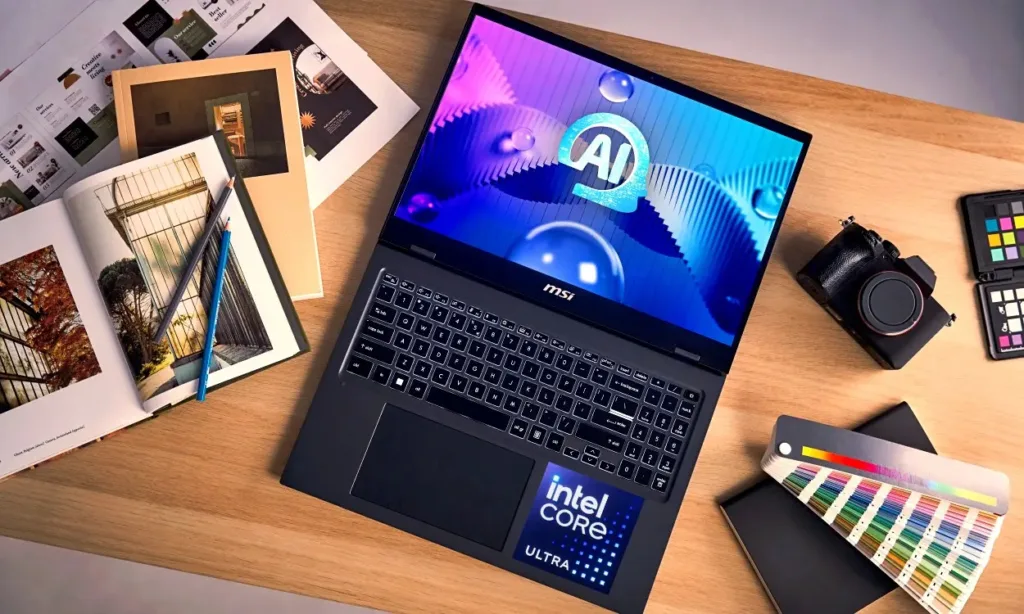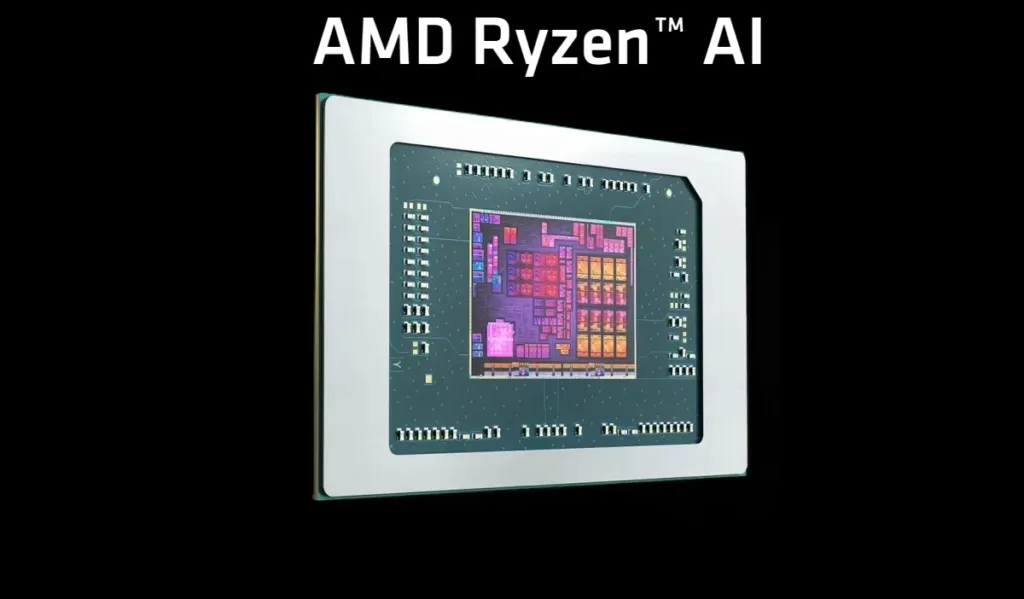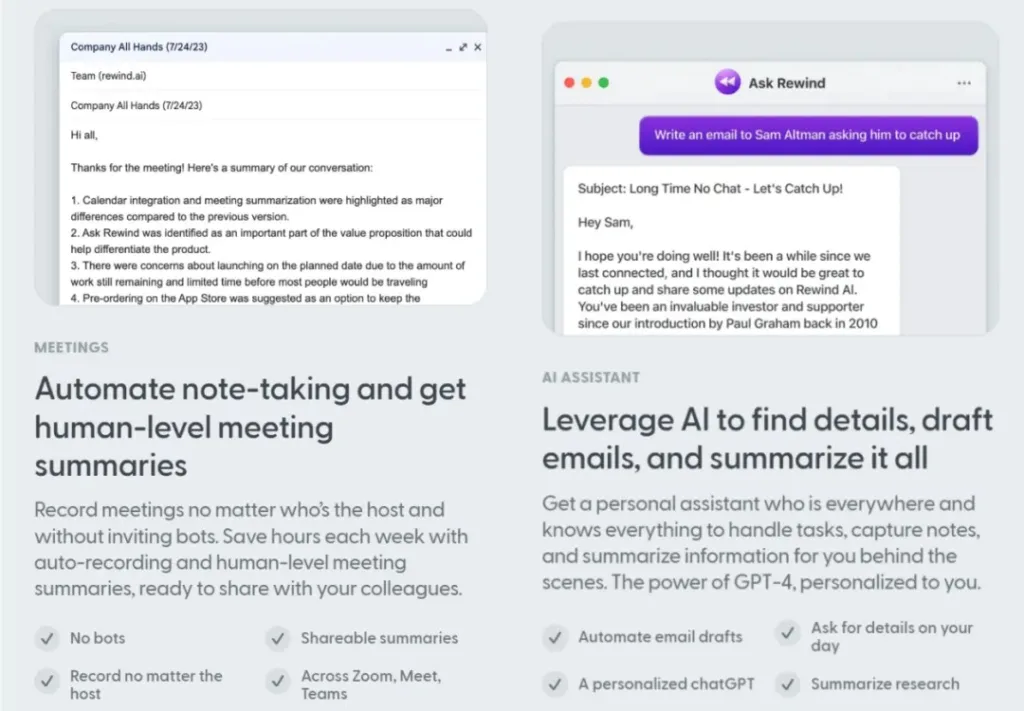
In 2024, the market is witnessing the launch of numerous new AI PCs from major brands such as Dell, HP, Lenovo, Asus, Samsung, and others. These manufacturers are all vying to promote their latest offerings under the banner of “AI PC.” But what sets these new AI PCs apart? What advantages and features do they offer compared to non-AI PCs?
We’re here to address these questions by comparing the latest generation of AI-enhanced PCs to their predecessors, examining factors like performance and efficiency. Ultimately, we aim to determine whether purchasing a new AI PC this year is worth it.
AI-Enabled PCs Featuring Intel & AMD Processors Launching in 2024
The AI PCs of 2024 are powered by Intel’s latest Core Ultra processors or AMD’s newest Ryzen 8000/7000 processors. These cutting-edge chips play a pivotal role in ushering in the AI era of computing. With the introduction of these new CPUs, both Intel and AMD have introduced several AI-centric features to their latest laptops.


While AI-enabled processors have yet to flood the desktop PC market, AMD has taken the lead by introducing the Ryzen 8000G series as the world’s first AI processor for desktops. Additionally, Intel is anticipated to release a new Lunar Lake architecture this year, along with a fresh lineup of processors for desktops on a new motherboard platform.
The PC industry is currently undergoing a gradual transformation, with a promising shift towards AI integration. There’s hope that consumers, like you and me, will be captivated by the new AI PCs of 2024.
Features of AI-Enabled PCs
These AI PCs of 2024 boast a plethora of new ‘AI-enhanced’ features. While the inception of AI PCs is still in its early stages, many of these advancements may appear rudimentary at present. Both Intel and AMD are heavily promoting the new laptops of 2024 with a strong emphasis on AI capabilities.
Neural Processing Unit (NPU)
The standout feature of the latest AI PCs in 2024 is the integration of an onboard AI accelerator within the newest processors from Intel and AMD, referred to as the Neural Processing Unit (NPU). This dedicated hardware component is purpose-built to accelerate AI tasks, offering a level of efficiency that surpasses the capabilities of the CPU and GPU. By leveraging the NPU for AI-centric workloads, the resources of the CPU and GPU can remain unburdened, allowing them to focus on handling heavy computing tasks.
The introduction of the NPU is poised to significantly enhance the efficiency of various users, including creative professionals, developers, and everyday users. Collaboration is expected to become more seamless, with popular communication apps such as Google Meet, Microsoft Teams, and Zoom offering AI-powered features like auto-framing, background blur, and eyesight correction. These features have become standard in many of today’s AI PCs.


Overall, the integration of the NPU represents a significant advancement in AI computing, promising to make tasks more efficient and streamlined for users across various domains.
Collaborative Capabilities of AI-Enabled PCs
Previously, non-AI PCs lacking an NPU, such as those equipped with processors like the Intel 13th Gen, still offered collaboration features similar to AI enhancements for video conferencing, as mentioned earlier. For instance, Azmotech’s hands-on review of the Samsung Galaxy Book 3 with an Intel Core i7-1370P processor showcased AI enhancements during video conferencing, including background blur, auto-framing, and noise cancellation. These same features now heavily promoted in AI PCs were present on this laptop.
So, what sets apart the new AI PCs in 2024, especially when previous PCs already incorporated AI features like these? The aforementioned demonstration ran on the CPU because the previous-gen Core i7-1370P lacked an NPU. AI features on many previous-gen laptops were often part of a specialized app, such as Samsung’s ‘Studio Mode’, or found in the software control panel.
In contrast, with 2024 AI PCs, the NPU is dedicated to handling numerous AI-related workloads. On older laptops featuring AI features, users often encountered warnings about increased power consumption when using features like noise cancellation or video call enhancements. However, with an NPU designed specifically for AI computing tasks, power consumption is significantly lower, aligning with the intended architectural design.
In our testing at Beebom, newer AI-enabled PCs in 2024 were found to utilize AI enhancements through the NPU, without compromising other essential system resources. When these AI features are active, you can observe the NPU usage in Task Manager, with its usage increasing accordingly.
For instance, within the Camera app of Windows 11, AI effects are now integrated into the app itself as part of Windows Studio Effects, rather than being a separate feature provided by the manufacturer. With all AI features enabled, the NPU usage ranged between 25-35%.

Additionally, there are several common features shared between AI PCs and non-AI PCs. Users can access popular artificial intelligence innovations like OpenAI ChatGPT, Google Gemini, Adobe Generative AI, and others. Nvidia has also introduced Chat with RTX, an AI chatbot that can run directly off an RTX graphics card (offline).
With this capability, practically any PC equipped with a compatible Nvidia RTX GPU could be considered an ‘AI-enabled’ personal computer, to some extent, even if older PCs lack an NPU. Now, let’s delve into additional features of AI PCs and then assess whether it’s worth investing in one in 2024.
Enhancements to AI Assistants on 2024 AI PCs
Both Intel and AMD’s onboard NPU can run AI assistants, albeit with smaller models. For example, Tony Mongkolsmai, a Software Architect at Intel, demonstrated TinyLlama and Google’s Gemma-2b AI models operating directly on the NPU.Similarly, Huggingface provides documentation on setting up the AMD Ryzen AI environment to run LLMs on the NPU of Ryzen 7000/8000 series processors.
Intel has also unveiled new AI assistants aimed at enhancing user productivity in the future. One such upcoming innovation, Rewind.ai, is expected to leverage the latest Intel Core Ultra processors and the NPU, slated for release on Windows later this year. It’s anticipated that more AI assistants will emerge in the future, effectively utilizing the NPU directly.
Described by Intel as an incredibly useful tool, Rewind’s AI assistant observes users’ actions and serves as a memory aid. Once configured, the AI assistant can recall past actions, providing assistance when needed.

Moreover, Rewind’s AI assistant automatically handles note-taking during meetings and can even assist in drafting email messages. This level of productivity enhancement is truly impressive, and I’m eager to explore more AI PC-exclusive features that are on the horizon. While tools like ChatGPT are remarkable, AI assistants like Rewind offer comprehensive productivity-enhancing functionalities. Although, it’s worth noting that these new AI assistants can feel more intimate as they observe user actions closely.
However, it’s not guaranteed that Rewind’s AI assistant will be exclusively available for new AI PCs. While it may consume more power, it could potentially run on non-AI PCs as well. In fact, the assistant is already accessible for macOS and utilizes minimal CPU power when enabled. Nonetheless, I anticipate that new AI PCs specifically designed for this era of AI-enhanced computing will offer a superior experience compared to non-AI PCs equipped with older processors.
Professional Content Creation and Generative AI Capabilities
According to Intel, new AI PCs equipped with Intel Core Ultra processors demonstrate significantly improved AI application performance benchmarks. Various tests, including AI-assisted content creation, generative AI, and AI-generated audio in Audacity, were conducted to evaluate the performance of these new AI PCs against older generation models.

In the comparison, several content creation applications such as WonderShare Filmora, Adobe Premiere Pro, Davinci Resolve, and Adobe Lightroom showed better performance on AI PCs with Core Ultra processors, leveraging the latest AI-enhanced features within these applications.
It’s worth noting that a significant portion of this performance gain can be attributed to the GPU. The graphics card in a PC is commonly utilized to accelerate AI tasks alongside the NPU. However, there are AI workloads where the GPU, CPU, and NPU collaborate to deliver optimal performance.
AI-Enhanced Audio Editing
Intel has demonstrated the remarkable capabilities of AI-enhanced audio editing with the latest addition of OpenVINO plugins to Audacity. Through these plugins, users can achieve innovative feats, as showcased in a demo where a musician effectively creates text-to-music on the latest AI PC.
Moreover, OpenVINO Music Separation allows users to isolate elements of a single audio layer, such as separating drum beats from a particular audio clip. These exclusive features available on AI PCs of 2024 directly benefit the work of musicians and audio engineers, offering new possibilities for creative expression.
Considering AI PCs in 2024: Worth a Second Thought!
Looking ahead, AI will continue to be a focal point in the industry. If you’re enthusiastic about leveraging AI capabilities, particularly in your work, and can benefit from currently available AI features, such as those described above, investing in a new AI PC could prove highly advantageous.
For individuals working in fields such as content creation, music, and development, the numerous new features offered by AI PCs in 2024 can prove highly beneficial. These advancements cater to specific needs and offer key advantages compared to older-generation PCs. However, it’s important to acknowledge that not everyone will find these features indispensable for their PC usage.
For general consumers who may not necessarily require AI features, the appeal of AI PCs released in 2024 may be limited. Many AI capabilities can still be leveraged without having the latest ‘AI PC’, as the term itself is largely a marketing distinction between newer and older PCs. Therefore, there’s no urgency to rush into purchasing an AI PC, especially considering that many applications are still in development, and the landscape of AI-enabled computing continues to evolve rapidly.
Why I’m Holding Off on Purchasing an AI PC (At Least for the Moment)
Additionally, the latest generation of processors hasn’t necessarily delivered significant performance gains, which may disappoint those who typically look forward to such advancements. However, future processors like Intel Lunar Lake and Arrow Lake, as well as advancements from AMD such as the Zen 5 architecture, are expected to bring notable performance improvements along with further AI-centric enhancements.
Looking ahead, the feature set of AI PCs is anticipated to evolve substantially, making them more compelling purchases in the future. Future AI PCs are likely to not only offer NPU and exclusive AI features but also deliver dramatic performance upgrades compared to current systems and older-generation options.
In conclusion, while the AI PC ecosystem is indeed exciting, it’s still in the process of maturing. Therefore, there’s no rush to invest in an AI PC, especially if your current workflow does not necessitate the use of existing AI technologies.




